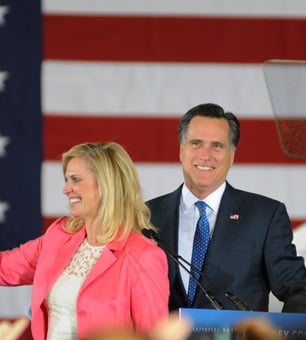 (Photo: BU Interactive News / Flickr)Entrepreneurs do create new value in the world and keep some portion of that value as a reward for their originality, risk-taking and hard work. But the Romneys are not entrepreneurs: They are rentiers – people “who siphon off wealth created elsewhere in the economy.”
(Photo: BU Interactive News / Flickr)Entrepreneurs do create new value in the world and keep some portion of that value as a reward for their originality, risk-taking and hard work. But the Romneys are not entrepreneurs: They are rentiers – people “who siphon off wealth created elsewhere in the economy.”
In 2011, Willard M. Romney and Ann D. Romney reported an adjusted gross income of $13,696,951 via tax returns that were highly skewed – both literally and figuratively.
Literally, the PDF provided to the press is skewed clockwise at a 2 degree angle. For $13 million, you’d think the Romneys could afford a higher-quality scanner.
Figuratively, the Romneys earned exactly $0 from “wages, salaries, tips, etc.” In other words, they earned nothing from any form of actual work. All of their income came from interest payments, dividends and capital gains.
To read more articles by Salvatore Babones and other authors in the Public Intellectual Project, click here.
The complete absence of wage and salary income makes the Romneys really stand out. Most Americans earn nearly all of their income from actual work, and according to the IRS about three-quarters – or 73.6 percent – of all personal income in the nation is reported on line 7, salaries and wages. Even among well-off American households with incomes over $250,000, more than half their income comes from work.
But the Romneys are truly rich, not just well-off. According to Census Bureau data, median household income in the United States was just over $50,000 in 2011. The Romneys report a household income some 272 times the US median. As many articles on the Romneys’ taxes have reported, the rich tend to make more money from investments than from working.
In fact, IRS tax return data compiled by the World Top Incomes Database puts the Romneys squarely in the top .01 percent of US households. That’s the top 1 in 10,000. That makes the Romneys very wealthy, though there are still more than 15,000 US households in the Romneys’ general range.
The average annual income of these top 15,000 US households is around $24 million, which places the Romneys in the lower-middle of the top .01 percent. That’s not bad, but it’s hardly Bill Gates territory. Romney isn’t even the richest American politician. New York mayor Michael Bloomberg is estimated to make several billion dollars a year. Comparatively speaking, Bloomberg is to Romney, as Romney is to us.
So, the truly distinctive thing about the Romneys isn’t their wealth: It’s the way they make their income.
Data from the World Top Incomes Database show that even among the top .01 percent of Americans, much of the reported income is from wages and salaries. The average across all returns is 22.9 percent. For the Romneys, of course, the figure is 0.
The Romneys, on the other hand, derived almost half (48.8 percent) of their incomes from interest and dividends. America’s top .01 percent as a whole, on the other hand, derived just 18.1 percent of their income that way. Compared to the rest of the richest of the rich, the Romneys are true old-fashioned rentiers. They don’t make money. Their money makes money.
That was true even when Mitt Romney ran Bain Capital. Economist Dean Baker of the Center for Economic and Policy Research writes that, seen from an economic perspective, Bain Capital’s business model consisted of “siphoning off wealth created elsewhere in the economy.”
When Romney talks on the campaign trail about encouraging the wealth creators, he certainly can’t mean people like himself.
Entrepreneurs do create new value in the world and keep some portion of that value as a reward for their originality, risk-taking and hard work. Real entrepreneurs, however, will never be deterred by taxes. For real entrepreneurs, creativity comes first.
Steve Wozniak and Steve Jobs created Apple computer in 1976, when the top marginal tax rate on interest and dividends was 70 percent. Bill Hewlett and Dave Packard started Hewlett-Packard in 1939 when the top marginal tax rate on interest and dividends was 78 percent.
Today, if you have a good tax accountant and you structure your interest and dividends just right, you pay only 15 percent, as the Romneys do on most of their income. No wonder Romney chose to become a rentier. Had taxes on interest and dividends been a little higher, he might just have become one of those fabled Job Creators after all.
Press freedom is under attack
As Trump cracks down on political speech, independent media is increasingly necessary.
Truthout produces reporting you won’t see in the mainstream: journalism from the frontlines of global conflict, interviews with grassroots movement leaders, high-quality legal analysis and more.
Our work is possible thanks to reader support. Help Truthout catalyze change and social justice — make a tax-deductible monthly or one-time donation today.
